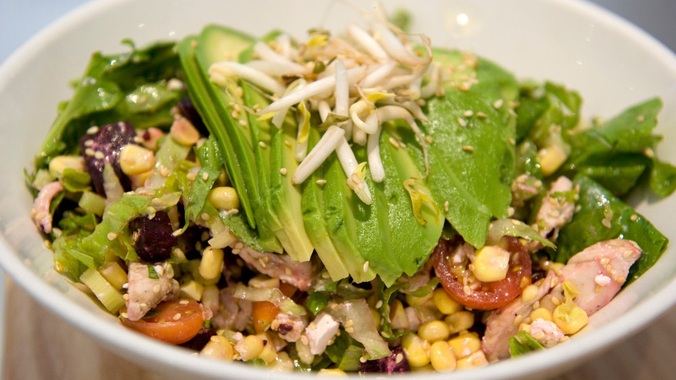Sea Point health food café Nü has opened a branch in Gauteng, offering junk food minus the junk, reports Brent Meersman.
The so-called “French paradox” is the observation that the French can take long luncheons with wine every day, indulge in fondue Savoyarde and croissants dripping butter, drown fillet and pommes frits in Bearnaise, and scoff endless pastries – and yet they suffer little of the obesity and heart disease found across the Atlantic.
Now there is also the “French intuition” – research that suggests for Americans unhealthy food is implicitly associated with tastiness, while for the French tastiness and healthy food go together.
How often has one heard “it’s healthy food that also tastes good” or seen “vegetables don’t have to taste bad or be boring anymore”, or read cookbooks proclaiming, “eat healthy, but tasty”? It has always seemed to me to be a false dichotomy.
My parents loved vegetables and following their example, this kid never turned up his nose at spinach or a bowl of broccoli. I loved beetroot, and chicory, and even red cabbage with apples.
We are not genetically predisposed to unhealthy eating. Junk foods are engineered to be addictive and produce cravings – their fat, sugar and salt hooking us like heroin.
Culture, parenting and advertising must surely be the most important determinants in taste. In a sense, all taste is “acquired”, though we may have an instinctual caution around bitterness because it has a real association with toxins.
But so entrenched is the Anglo-American cultural prejudice against healthy food tasting good that health food establishments have to work extremely hard to dispel the bias.
In the 1980s, there was just one health food restaurant in Cape Town – The Granary in Sea Point, which served milkshakes with wheatgerm, an ingredient you bought at the chemist, not the supermarket.
Society is changing and entrepreneurs, such as the Kauai chain, have responded. Six months ago, Sea Point Main Road got a new health food café. Opened as NüMi (for “new me”), it quickly became just Nü. Last month, a branch opened in Gauteng.
One of its major strengths is its attractive, bold design, with an eye clearly on franchise replication – the purple exterior; a clean, white, canteen-like interior; neon yellow chairs and tables with an unusual shape; a counter with three large menu screens where you place orders fast-food style.
But this isn’t junk food: quite the opposite.
New way of eating
Nü positions itself as serving up “the freshest global trends using the finest local produce”. Food is free of additives, colourants, hormones, GMO and MSG “where possible”. The operation says its core values include sustainable practices and social responsibility. Artisanal bread is baked in wood-fired hearth ovens in Woodstock; the multigrain wraps “are produced in an HACCP [hazard analysis and critical control points] accredited bakery that boasts a level five BEE status”.
Juices are grouped under “power blends”, “green blends” and “functional blends”. They are fairly conservative to taste and should have broad appeal – apple, lemon and mint sort of thing. Many are more intriguing – such as orange, spinach and avocado.
I had a delicious “super juice” with apple, spinach, cinnamon and walnuts, cooled with ice blocks. The texture of the ground walnuts coming up through the straw had a great mouth feel. The spinach was visible, but disappeared in the taste.
Then there are smoothies made from low fat, plain, frozen yoghurt with various combinations of fruits, nuts, and seeds, and some with mint or vanilla or rooibos espresso.
The “super boost farmacy” section allows you to add natural “boosters”. So there are hemp seeds, raw agave nectar from Tanzania (processed below 46°C), a shot glass of organic wheatgrass said to “assist red blood cell production” and “alkalise” – whatever that means. Nü should be congratulated for generally being sensible, but the menu does stray into pseudoscience and quackery. A shot of hot ginger not only “relieves nausea” but is also an “immune booster, anti-inflammatory, decongestant [and] aphrodisiac”.
For breakfast, besides free-range egg open omelettes with avocado, rocket, feta, smoked Norwegian salmon and the like, you might try a protein flapjack (free of gluten and sugar) made with whey and blueberries and served with banana, walnuts and honey.
For lunches, there are chopped salads that also come as a wrap, open sandwich or in variations with quinoa. The dozen or so dishes, each with a long list of ingredients, can be somewhat perplexing at first. Best is to see if any contain something you particularly don’t like and then work your way through the short list.
Although all the core dishes are vegetarian one can also add a protein of choice – tuna chunks (in brine of course), salmon or free range chicken breasts, said to be free of antibiotics, growth promoters, animal by-products and “very importantly, stress”.
Anyone who still thinks healthy food (or rabbit food as it used to be disparagingly called by the old South African meat-and-potato brigade) cannot be tastier than junk food, hasn’t eaten at Nü.
WHERE: Nü, Shop 3, Piazza St John, 395 Main Road, Sea Point, Cape Town. Tel: 021 439 7269. Nü, Shop 8, Waterfall Corner, Cnr Woodmead & Maxwell Drive, Midrand. Tel: 010 596 8940
Photo Credit: David Harrison/M&G







